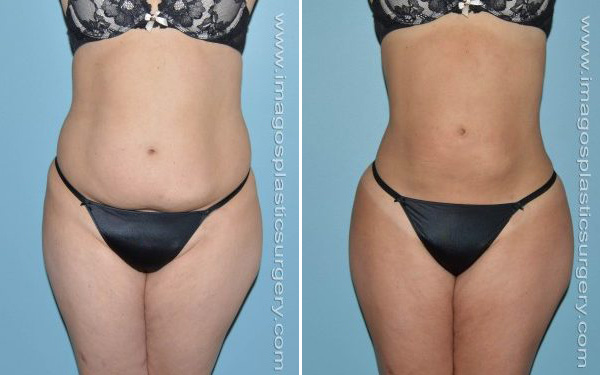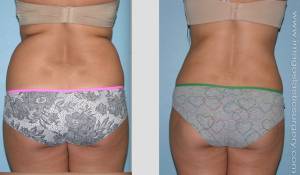Liposuction has an FDA-approval to remove as much as 11 pounds of fat in a single procedure. However, as we’ll learn here, this doesn’t necessarily translate to the patient weighing 11 pounds lighter after liposuction. There are many considerations patients and surgeons must take into account before committing to liposuction, and it shouldn’t be viewed purely as a weight-loss procedure.
Here, Miami liposuction surgeons Dr. Jose Perez-Gurri and Dr. Onelio Garcia discuss how much weight you can expect to lose with liposuction and look at how patients can hope to get the best results possible from their procedure.
If you would like to learn more about Miami liposuction, please continue reading or schedule an informative consultation with one of our plastic surgeons today! Our Miami practice proudly serves patients from all over Florida, including Naples, Fort Lauderdale, Orlando, Tampa, Ft. Myers, and many other areas.





What Is Liposuction and How Does It Work?
Liposuction, often referred to as ‘lipo,’ is a popular cosmetic surgery procedure that breaks up and sucks fat from the body. It works by a surgeon creating a small incision in the treatment area, through which a cannula is inserted. Through this cannula, fat is removed via a vacuum.
The primary areas targeted by liposuction include thighs, buttocks, arms, neck, and lower abdomen.
What is VASERlipo®?
VASERlipo®, or Vibration Amplification of Sound Energy at Resonance liposuction, is an advanced body contouring procedure that selectively removes unwanted body fat. This technique uses ultrasound technology to break down fat cells for easier, less damaging removal through a small tube called a cannula.
Is Liposuction a Weight Loss Procedure?
No, liposuction isn’t a weight loss procedure. It is a body contouring procedure that helps remove localized areas of stubborn fat that aren’t responding to diet healthy nutrition and an active lifestyle.
How Does Liposuction Differ from Weight Loss Procedures?
Weight loss procedures, such as bariatric surgery, aim to reduce the body’s capacity to ingest or absorb calories, which leads to weight loss over time, whereas liposuction is a body-contouring procedure that provides patients with immediate results in terms of appearance but doesn’t significantly impact the body’s weight.
What Are Some Factors That Can Affect Weight Loss with Liposuction?
The main factors determining the amount of weight loss with liposuction include the patient’s current state of health, their BMI, and their reasoning and goals for undergoing liposuction. Obviously, patients with higher BMI’s will likely lose more fat in a liposuction procedure, but this might be proportionally less than a patient with a lower body weight. It all depends on the patient.
How Much Weight Can You Expect to Lose with Liposuction?
The amount of fat removed during liposuction varies based on the individual, the target area, and the specific technique used.
As a safety guideline, surgeons usually limit fat removal to no more than 11 pounds (5,000 milliliters) in an outpatient setting, which is the FDA-approved limit.
However, fat is not as dense as other body tissues, which means that removing 11 pounds of fat won’t necessarily translate into an 11-pound weight loss on the scale. The actual weight loss might be less than you’d expect when considering the volume of fat removed.
A patient might only experience a weight loss of a few pounds, even with a substantial amount of fat removed. The visual improvement in body contour and shape, however, is more often than not very significant and satisfying for patients.
Can Liposuction Help You Lose a Significant Amount of Weight?
No, liposuction can’t help patients lose a significant amount of weight. It can help jump-start a lifestyle change, or in other cases, it can be sued as a way to help remove the final stubborn pockets of fat after a committed effort to lose weight their proper nutrition and training.
Who is a Good Candidate for Liposuction?
Good candidates for liposuction are people in good health, within 25-30% of their recommended body weight, and have realistic expectations for what the procedure can help them achieve. A positive outlook and commitment to maintaining and improving results are even better!
What Are Some Non-invasive Fat Reduction Procedures?
Liposuction is used when there is a greater amount of body fat to be removed. For patients closer to their ideal aesthetic, but who want just a touch taken off to really make their physique “pop”, VASERlipo and Non-Surgical Body Contouring are two fantastic procedures available.
What is Bariatric Surgery?
Bariatric surgery is designed for those who are more than 40% over their recommended bodyweight. It works by stapling the stomach walls together, making it smaller, which is meant to limit the amount of food one can consume.
How Can You Maximize the Results of Liposuction?
Maximizing the results from your liposuction procedure comes with effort and a dedication to leading a healthy, active lifestyle. This involves eating properly, drinking properly, exercising regularly, and getting enough sleep to make sure you manage your stress levels.
This is the single biggest factor determining your long-term results from weight loss. Patients absolutely must commit to eating as clean and balanced a diet as they possibly can. This means eating natural, whole foods – not processed fast foods. Think meats, dairy, vegetables, fruits, pulses, greens, grains. Educating oneself about how to eat properly is the best way to make this a sustainable life choice.
Hydration is key in maintaining your liposuction results. Water aids digestion, removes bodily wastes, and optimizes metabolic function, helping to control weight and maintain your new body contour.
Exercise is another vital factor in maintaining your post-liposuction body. Regular physical activity, especially strength training, can help preserve muscle mass, increase metabolism, and prevent fat accumulation.
Stress can cause weight gain and disrupt your efforts to maintain liposuction results. Implementing stress management techniques, such as meditation, yoga, or simple breathing exercises, can be beneficial.
Schedule a Consultation for Miami Liposuction
Liposuction is an effective procedure for removing stubborn pockets of fat and contouring the body, but it’s not a solution for significant weight loss. Understanding this distinction is crucial when considering your options for achieving your desired physique. As always, consult with a healthcare professional or a qualified surgeon to discuss what’s best for your individual needs.
Liposuction FAQs
Liposuction is a good way to start a weight-loss journey. It helps patients get a jump-start on results which can help with motivation, but it isn’t a good nor a sustainable way to lose weight.
The amount of inches you can lose off your waist with liposuction varies based on individual factors, but typically, patients may see a reduction of 1 to 2 inches. Remember, the goal of liposuction is to improve contour, not to significantly reduce size.
Yes, you may appear thinner after liposuction, especially in the targeted areas, because the procedure removes fat deposits, which helps enhance the body’s overall contour and proportion.
Liposuction can improve the contour of your stomach by removing localized fat, but it doesn’t guarantee a completely flat stomach. Factors like skin elasticity and overall health also play a critical role in the final result.
Post-liposuction swelling is common and can make you look bigger in the weeks following the procedure. This is a temporary condition and typically resolves over time as the body heals.
Liposuction involves discomfort and some pain, but the intensity varies from person to person. Pain is usually managed with medications, and most people describe the recovery as uncomfortable rather than extremely painful.

